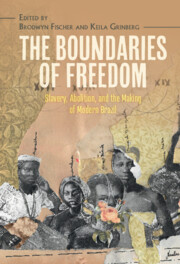Acknowledgments
This collection owes its greatest debt to the generations of scholars who have collectively reimagined the history of Brazilian slavery, abolition, and freedom over the past half-century. The work here only exists in dialogue with this immensely rich body of scholarship. We owe thanks as well to the Brazilian public institutions that have made deep historical work possible by supporting universities, archives, libraries, museums, and the students, scholars and artists who occupy them. The Brazilian National Council for Scientific and Technological Development (CNPq), the Brazilian Coordination for the Improvement of Higher Education Personnel (CAPES), the Carlos Chagas Foundation in the State of Rio de Janeiro (FAPERJ), and the São Paulo Research Foundation (FAPESP) have directly supported much of the research for this volume. At a time when faith in the public value of historical research is under grave threat, it has never been more important to recognize the enormous social and intellectual impacts of such investment.
We also owe thanks to a number of people and organizations in the United States. The Tinker Foundation sponsored Keila Grinberg’s visiting professorship at the University of Chicago. The Tinker Foundation and the University of Chicago’s Center for Latin American Studies, Franke Institute for the Humanities, and Center for the Study of Race, Politics and Culture funded the two workshops that incubated The Boundaries of Freedom from idea to text. Natalie Arsenault, Jamie Gentry, and Claudia Giribaldi made our meetings possible with their generosity, warmth, and expert organizational skills.
The discussions at those two conferences involved a far wider circle than is represented in these pages. Felipe Azevedo e Souza, Dain Borges, Mariana Candido, Sidney Chalhoub, Roquinaldo Ferreira, Israel Ozanam, and Martha Santos were an integral part of the initial discussions, and we are very grateful for their impact on the work published here. Paulina Alberto, Peter Beattie, Dain Borges, Sherwin Bryant, Caitlin Fitz, Thomas Holt, Emilio Kourí, Kate Masur, Agnes Lugo-Ortiz, Julie Saville, and Tara Zahra all offered generous comments on our draft articles. Amy Dru Stanley, Larissa Brewer García, César Braga Pinto, and many others offered precious feedback.
We are grateful also to George Reid Andrews and Alejandro de la Fuente for finding a home for this work in their Afro-Latin American series, as well as to Cecilia Cancellaro, Ruth Boyes, and everyone else at Cambridge University Press who worked to bring this project to completion. We are grateful as well to Sofía Kourí for editing the footnotes and bibliography, to Tanya Izzard for the index, and to Wade Guyitt for copy editing.
The coeditors would like to extend thanks to all of the volume’s contributors and also to our families, who have been more than patient with our periodic absences, late nights, and postponed conversations. Finally, we wish to express our deep sadness at the untimely passing of Ricardo Salles in November of 2021. A key contributor to this volume, Ricardo was among the most preeminent historians of his generation. His essential work on slavery, abolition, agrarian economies and the Paraguayan War left an indelible mark on our field, and his friendship and collaboration enriched our personal and professional lives. Ricardo’s influence infuses this volume, and we pay tribute to his life work.



